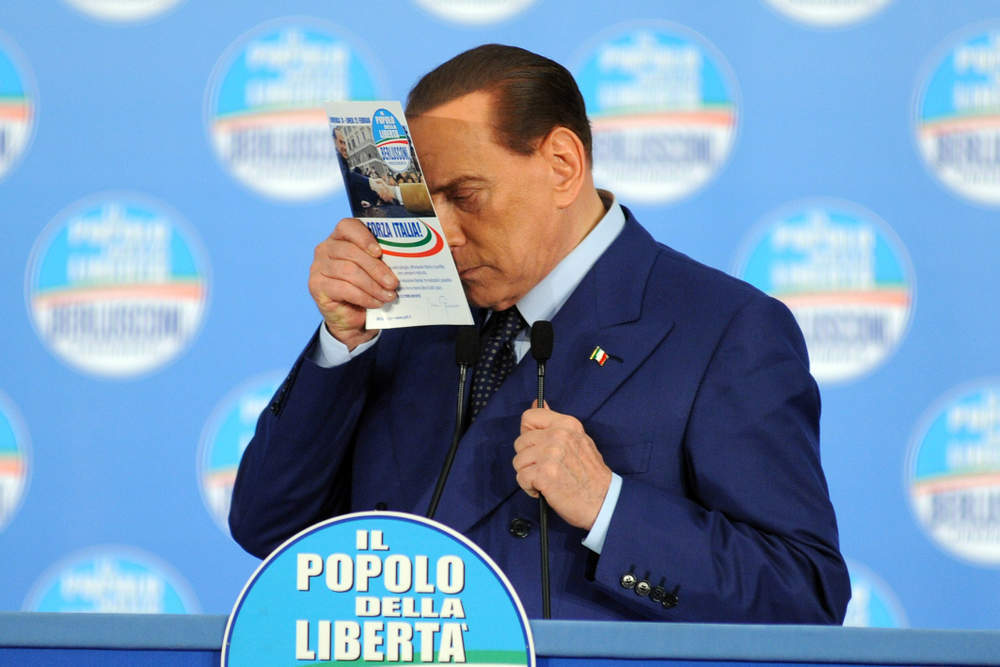
In 1994, Silvio Berlusconi rose to power as the symbol of a sentiment of change and progress that made him one of the most successful – though controversial – politicians in Italy’s modern history.
For over 20 years he ruled Italian politics, forming three government and bringing the country together.
Yet during the last Italian General Election, the 81-year-old leader saw his centre-right party Forza Italia (Go Italy), lose votes to far-right party Lega Nord (Northern League) and become the second party in the conservatives’ coalition.
As the two formal winners of the election, the Lega and the populist Five-Star Movement, prepare their alliance to take control of the government, they seem keen on phasing out the infamous Bunga Bunga politician.
Cameras caught him fuming last week as he hit out at the leader of far-right party Lega Nord (Northern League), Matteo Salvini, and accused him of betrayal over the appointment of the new speaker for the Parliament’s Senate.
After dominating Italian politics for 24 years, Berlusconi finally appears to be on the way out.
How well do you really know your competitors?
Access the most comprehensive Company Profiles on the market, powered by GlobalData. Save hours of research. Gain competitive edge.

Thank you!
Your download email will arrive shortly
Not ready to buy yet? Download a free sample
We are confident about the unique quality of our Company Profiles. However, we want you to make the most beneficial decision for your business, so we offer a free sample that you can download by submitting the below form
By GlobalDataBerlusconi is no longer the backbone of a coalition government
Mattia Guidi, Florence-based assistant professor in political science at Pisa’s Scuola Normale Superiore, told Verdict:
Before the elections, two potential scenarios could have worked for him, the first one being a victory of the centre-right coalition and the second one, in absence of a majority, the chance to form a coalition between Forza Italia and the Democratic Party (PD).
None of these happened.
The centre-right does not have the majority alone and the actual winner of this coalition is Salvini. The PD also did not go well, so Berlusconi, despite being crucial in helping the creation of a majority party, can no longer be the backbone of a coalition government.
His failure to secure his position within the party and as the leader of Italy, means he cannot weigh in on the creation of a new government as much as he hoped, sparking speculation that this could be the end of his political career.
“The centre-right coalition keeps suffering from the fact that it was partially created just to get as many votes as possible but is lacking common traits among the parties in almost every aspect,” Guidi said.
Berlusconi and Salvini clearly had two different agendas: Berlusconi nominated as Forza Italia’s candidate the president of the European Parliament, Antonio Tajani, while Salvini surrounded himself with euro-sceptic economists.
To a certain extent, we can say that he is responsible for his own mistakes because he had agreed with Salvini that whoever would have won within the centre-right coalition would have become the major candidate to become prime minister.
He now has found himself delegating to Salvini the task to negotiate with other parties.
Forza Italia won’t survive without Berlusconi
Enea Desideri, research associate at pan-European think tank and campaign group Open Europe, told Verdict this could be the end of Berlusconi’s long-lasting reign in Italy.
However, it’s too early to draw conclusions.
The last election marked a new chapter in Berlusconi’s political history. For the first time, he is no longer the focal point numerically inside the Italian centre-right party.
From a practical point of view, however, he probably still has a role to play, because Salvini doesn’t have that same ability to unite all centre-right parties under one leadership. However, he is no longer living his golden age of Italian politics.
Yet, according to Desideri, his turbulent relationship with Salvini is the tip of the iceberg in what seems to be the decline of Berlusconi, as well as of his whole political party in Italian politics.
Forza Italia, like PD, is now considered as an establishment party, while the elections have represented a vote against the establishment in a situation when the Italian economy is slowly going back to do well.
People want a change and Berlusconi does not represent. He did so in 1994, but today he only represents the failure of Italian politics of the past 20 years.
Desideri added that Berlusconi has failed to create a legacy for the party that he created in the early 1990s and does not have an obvious successor.
Berlusconi’s image is weakening
With the Democratic Party losing consensus and Forza Italia dropping points in the election, Berlusconi’s image is weakening too.
Guidi said:
The paradox is that when he was Prime Minister he was despised by his enemies, and several international politicians could barely stand him.
In 2011, his presence at the government was felt as a reason for embarrassment. His former international enemies almost cuddled him, with Merkel, Junkel and several other European partners treating him well as he was meant to win.
Now that he is weaker, it looks like he is much more respected than when he was stronger. This is because he cannot play the role of the person who breaks the mould and the rules and is now playing the role of the old and responsible politician.
Berlusconi’s age is also becoming a problem for his political career.
Guidi thinks his age has prevent him from running the electoral campaign with the same vigour he had in his youth.
Berlusconi’s weakness during this electoral campaign and the past few years is also physical.
He has always managed to make his body language coincide with his political agenda. The fact that he often underwent aesthetic surgery in order to appear young was also part of his plan to look invincible and eternal.
This is clearly less evident because he is ageing and he no longer has that body language he had years ago.
He could not conduct his political campaign as he wanted to — his doctors told him to slow down.
No one wants to rule out a Berlusconi comeback, however.
Guidi said:
The expression ‘never say never’ probably fits Berlusconi more than anyone else, so he will probably remain in the Italian scene as long as he can.





